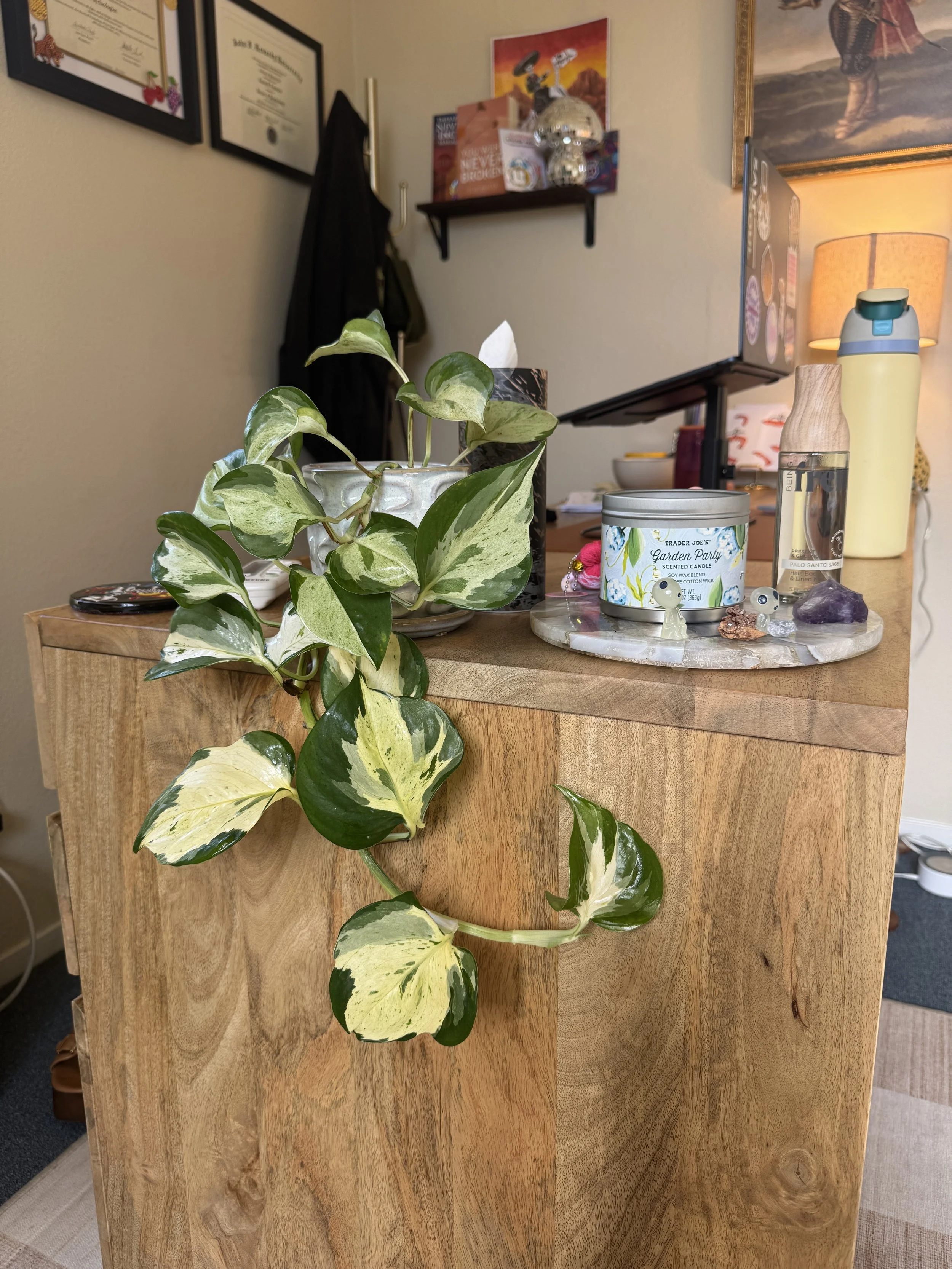
Therapy for Body Image & Disordered Eating
Nourish Your Body and Mind With Balance and Understanding
Supportive Therapy for Disordered Eating and Body Image
Struggling with your relationship to food or the way you see your body can feel isolating and overwhelming, but you don’t have to go through it alone. Whether you’re facing lifelong body image difficulties or are newly recognizing the toll of disordered eating patterns, our work together can be a decisive step toward healing. This page offers an overview of my unique approach to disordered eating therapy, what to expect, and how evidence-based practices and compassionate care support you.
Understanding Disordered Eating and Body Image Challenges
Disordered eating can show up in many ways—food restriction, bingeing, obsessive thoughts about eating, or constant worry about body size. Even if you don’t have a formal eating disorder diagnosis, these patterns can be deeply distressing and interfere with your daily life. As a psychologist with extensive experience supporting recovery from diet culture, disordered eating, and other body focused challenges, I support clients in exploring the underlying beliefs and emotions driving these behaviors so they can develop a healthier, more peaceful relationship with food and their bodies.
Body image issues therapy is often a critical part of this process. When your self-worth is tied to how you look or what you weigh, it can feel like your body is the enemy. Therapy helps shift this relationship so you can move toward self-acceptance, rather than self-judgment.
Reframing Body Image Through Therapy
Body image therapy goes beyond how you see yourself in the mirror—it’s about how you feel in your skin and how much power that feeling holds over your daily life. This work invites you to separate your self-worth from appearance and reclaim mental and emotional space once occupied by body shame.
Together, we’ll examine the social and personal narratives that have shaped your body image, challenge unrealistic standards, and build a more compassionate way of relating to your body. Whether you're working through body dysmorphia, shame, or years of dieting, therapy offers a path toward body respect and inner peace.
How Disordered Eating Therapy Works
My approach is rooted in evidence-based and weight-inclusive models, emphasizing emotional healing over external appearance. Through disordered eating therapy, we focus on increasing body trust, reducing food-related anxiety, and challenging perfectionism or all-or-nothing thinking.
A key component of our work may include Cognitive Behavioral Therapy, which helps identify and change unhelpful thought patterns that reinforce disordered eating. For example, thoughts like “I’m only good if I eat perfectly” or “I need to lose weight to be loved” are explored and replaced with beliefs grounded in self-worth and personal values.
On a deeper, more soulful level, I integrate somatic and compassionate practices to help you explore the function of your body, as well as whatever troubles you may have, to help build a more cohesive, vulnerable, and connected relationship with yourself. I also employ mindfulness practices to explore your body’s true needs and wants.
In parallel, we examine how your environment—including diet culture, social media, and past experiences—has shaped your relationship with food and your body. This deeper insight supports real, lasting change.
Integrating Intuitive Eating and HAES
A central part of my practice includes principles from Intuitive Eating and the Health at Every Size (HAES) framework. These models support a non-diet, weight-inclusive approach to health and well-being.
Intuitive Eating helps you reconnect with your body’s signals and break free from restrictive food rules. Instead of labeling foods as “good” or “bad,” we focus on eating with satisfaction, awareness, and trust. The goal is not perfection—it’s flexibility, pleasure, and balance.
The HAES philosophy emphasizes body diversity and that size does not determine health. It supports compassionate self-care and honors your body's unique needs without trying to force it into a mold. By incorporating these approaches into disordered eating therapy, we move from control and restriction to freedom and self-trust.
Reclaiming Energy for What Matters Most
One of the greatest gifts of healing your relationship with food and your body is reclaiming energy for the rest of your life. As the obsessive thoughts and guilt begin to quiet, many clients notice they’re more present in their relationships, more focused at work, and more in touch with what truly brings them joy.
Instead of being ruled by what you’ve eaten, what the scale says, or how clothes fit, you begin living from a place of deeper alignment and personal agency. This is the true goal of disordered eating therapy—not just symptom relief, but a fuller, more connected life.
What to Expect in Our Session
When beginning therapy, we prioritize creating a space where you feel safe, respected, and heard. As your therapist for disordered eating, I’ll collaborate with you to set goals based on your unique needs—whether that’s learning where the difficulty comes from, improving body image, or letting go of exhausting food rules.
In our sessions, you can expect to explore emotional and behavioral patterns around food, identify the origins of negative body image, and learn mindfulness and self-regulation tools. We’ll work on reconnecting with internal cues like hunger, fullness, and satisfaction, while also challenging black-and-white thinking around “good” and “bad” foods. Throughout the process, we’ll move at a pace that feels right for you, building trust in our therapeutic relationship and yourself.
You Deserve to Feel at Home in Your Body
Beginning with therapy for disordered eating or body image concerns can feel vulnerable, but it can also be one of the most empowering decisions you make. With the proper support, healing is not only possible, it's within reach.
If you're tired of battling food and body shame, or if you're curious about what life could look like on the other side of diet culture, I’m here to walk with you. Let’s create space for compassion, healing, and freedom—together.




